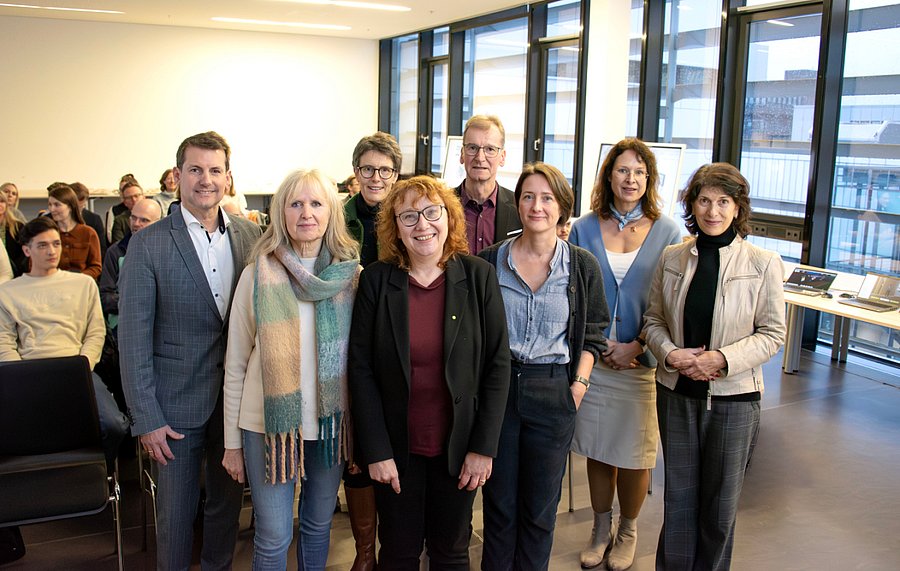Project completion EhLSa
Digital tools take the pressure off classroom teaching and promote hybrid learning

Worked for around four and a half years on the development and implementation of digital and hybrid learning formats (from left to right): Prof. Dr Nils Crasselt, Prof. Dr Angela Preisfeld, Prof. Dr Vivien Heller, Prof. Dr Susanne Buch, Prof. Dr Dietmar Tutsch, Prof. Dr Claudia Schrader, Prof. Dr Anne-Rose Meyer-Eisenhut and Prof. Dr Svetlana Petrova // Photo Friederike von Heyden
The starting point for the project was the experience of the coronavirus pandemic. This had triggered a significant surge in digitalisation at universities: teachers and students tried out new formats and recognised clear added value in the newly gained flexibility through the use of digital measures. At the same time, however, many students reported motivation problems and a lack of dialogue. This is where the project teams came in and developed concepts that closely interlink digital self-study phases and interactive face-to-face phases in terms of didactics.
Digital learning platforms with a lasting effect
The project was realised in five sub-projects:
- GerLiLi (German Studies) offers a learning platform on which students can work flexibly and independently on key concepts of linguistics and literature.
- digiTu (economics) provides a digital tutor, an assistance system that individualises mathematical practice and relieves teachers during attendance phases.
- INTENCE (Electrical Engineering) has developed an adaptive learning platform for getting started with the C programming language.
- CoLaB (School of Education) has designed a virtual meeting place for student teachers that promotes professional orientation during their studies through game-based learning.
- IGeL (Institute of Educational Sciences) offers a university-wide self-study programme that teachers and tutors can use to develop media didactic skills.
Networking and further development
Numerous synergies have emerged over the course of the project: the German studies tool GerLiLi now utilises the technical platform of electrical engineering. In addition, a joint further development is planned with "intenceToGo", which makes learning content from both subjects available in small units - for example for travelling by bus, train or short breaks.
After around four and a half years, the participants draw a positive conclusion: "EhLSa has shown that digital learning opportunities do not replace classroom teaching, but can enhance it - they create free space for teachers and students that can be used for in-depth study and discussion, for example," says Prof Dr Susanne Buch, Vice-Rector for Teaching and Learning. At the same time, the programmes support students in developing an academic learning mindset. They thus expand the BUW's toolbox for supporting students in their first semesters.
Outlook
The sub-projects will continue beyond the term of the programme and enrich teaching at the University of Wuppertal. The solutions developed are available for broad use on the state portal and are already in use at other universities. Connections are already being planned in several faculties in order to transfer the developed tools to other subjects.
More information at: https://ehlsa.uni-wuppertal.de/de/
